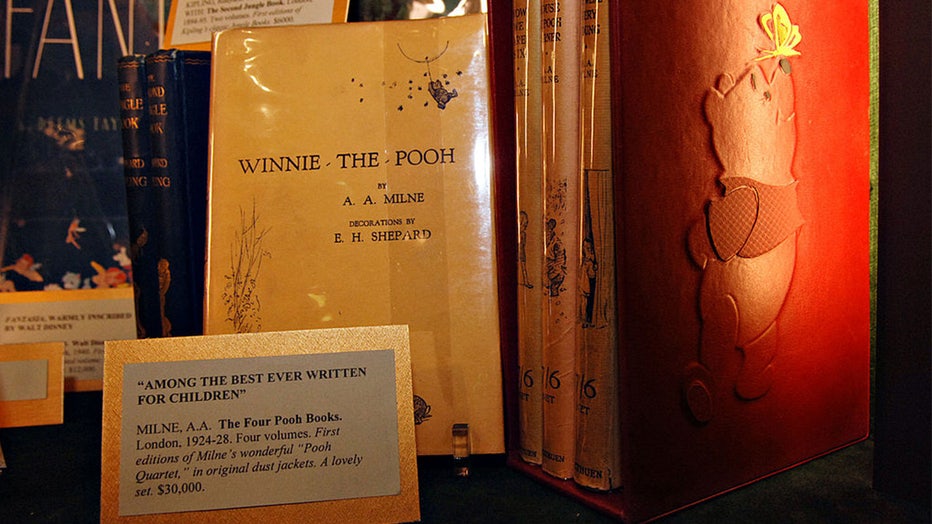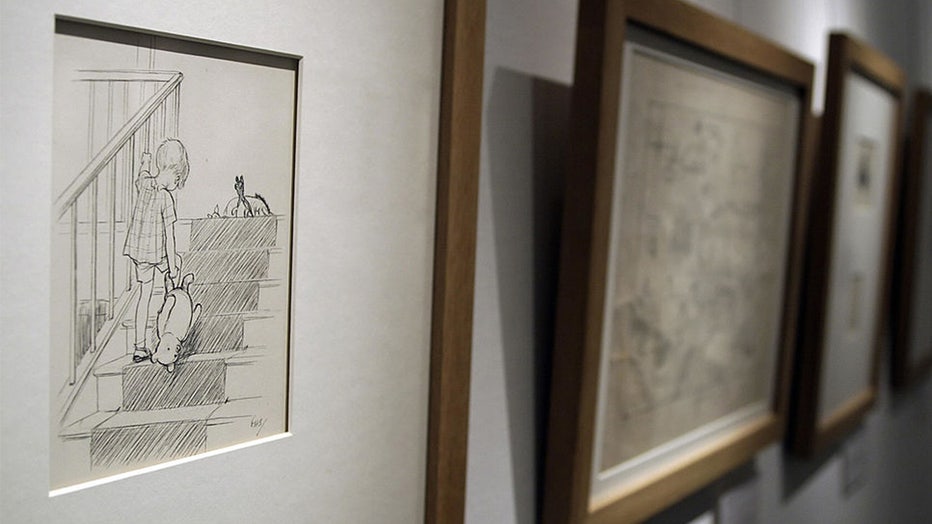National Winnie the Pooh Day: How the story has been reimagined since it became public domain
FILE - A rare American first edition of a Winnie-the-Pooh book signed by the author A.A. Milne and illustrator E.H Shephard is displayed with Pooh characters form a 1930's game at a press preview at Sotheby's Auctioneers on Dec. 15, 2008 in London. (Peter Macdiarmid/Getty Images)
Jan. 18 marks National Winnie the Pooh Day, as well as the birthday of the beloved honey-loving resident of the Hundred Acre Wood.
While the original "Winnie the Pooh" books were published nearly a century ago, the narrative of the befuddled bear and his adventures with Piglet, Tigger, Eeyore and Rabbit remains popular with families and young children.
But since A.A. Milne’s original "Winnie the Pooh" entered the public domain two years ago, there have been some truly novel uses of the pre-Disney character.

FILE - A four volume set of first edition copies of Winnie-The-Pooh by A.A. Milne sit on display in the Bauman Rare Books booth at the 52nd Annual Winter Antiques Show in New York Thursday, Jan. 19, 2006. (Daniel Acker/Bloomberg via Getty Images)
Here are some of the more unique iterations of Winnie the Pooh since the story became public domain that might make you say, "Oh, bother."
"Winnie the Pooh: Blood and Honey" movie
The announcement of a Pooh-themed horror movie in 2022 raised quite a few eyebrows and allegedly brought on some death threats toward the movie’s creator, Rys Frake-Waterfield.
While many fans of the childhood classic were not completely thrilled with the thought of a version of Pooh and Piglet who had a bloodlust, the movie debut brought in nearly $1 million in two weeks, according to AFP.
The entire 2-minute film had a budget of less than $250,000.
Frake-Waterfield said he originally hoped the film "might do a mini theatrical run in certain areas." But now he believes it could achieve the highest "budget-to-box office ratio" since "Paranormal Activity," a $15,000 film in 2007 that launched a nearly $1 billion franchise.
"I really believed in the idea," Frake-Waterfield told the AFP. "Other people didn't... and now it's doing all right."
Watch: 'Winnie the Pooh: Blood and Honey' official trailer
The new "Winnie the Pooh: Blood and Honey" trailer is out, and warning -- it's graphic. (Credit: Jagged Edge Productions and ITN Studios)
RELATED: Early Mickey Mouse already starring in horror flicks just days into public domain freedom
‘Winnie-the-Pooh: The Deforestation Edition’
The toilet paper company Who Gives A Crap decided to create a Winnie the Pooh-themed book which aimed to raise awareness about deforestation.
The book looked almost identical to A.A. Miline’s original, except the Hundred Acre Wood looked different – there were no trees.
The whimsical map which usually showed all of Pooh’s friend’s homes inside a lush forest, was a somewhat depressing map that only showed what appeared a Hundred Acre Wood after deforestation; even Piglet’s treehouse was reduced to a stump.
Who Gives A Crap has tried to raise awareness about the ravages of deforestation, even saying that "over a million trees are cut down every single day just to make traditional toilet paper."
Deforestation destroys natural habitats and ecosystems and can result in more carbon dioxide being released into Earth’s atmosphere, according to the National Geographic.
Just as Smokey the Bear was created to help prevent forest fires, so too was Pooh’s Hundred Acre Wood home reimagined to hopefully shed light on the devastation of deforestation.

FILE - An original illustration of Winnie-the-Pooh entitled "Bump, bump, bump - going up the stairs" by E.H. Sheppard is displayed at Sotheby's auction house in London, on Dec. 15, 2008. (Leon Neal/AFP via Getty Images)
‘Winnie-the-Screwed’ by Mint Mobile
Ryan Reynolds' Mint Mobile capitalized on Winnie the Pooh's entry into the public domain with an advertisement.
The advertisement focused on a book cover and show illustrations of the beloved bear's struggle with his phone bill while Reynolds narrates with a voice-over and is accompanied by light piano music.
"Here is Edward Bear reviewing his latest bill from Big Wireless. Bump, bump, bump, he slams the front of his head as hard as he can against the table as he realizes how much he’s being charged," Reynolds says as a drawing depicts the character slamming his head against a table. "It is, as far as he knows, the only way to have a cellphone, because he hasn’t yet switched to Mint Mobile. Anyhow, here he is getting worked over like so many people, and ready to be introduced to you. Winnie-the-Screwed."
Reynolds went on to say that Winnie the Screwed "just wants to keep some of his sweet, sweet, money" but that his "money jar gets emptier and emptier with every monthly bill."
"So I told Christopher Robin that anyone can get three free months of Mint Mobile now until Friday at midnight," he adds. "Unless my interpretation of copyright law is wrong."
According to the Copyright Term Extension Act, also nicknamed the "The Mickey Mouse Protection Act," a company's copyright on a "work for hire" is 95 years from first publication or 120 years after its creation, whichever ends sooner.
While the first Winnie the Pooh story published in 1926 is free for anyone to use for inspiration for new projects, Disney will continue to maintain copyright protection over its own versions of the characters.
FOX Business contributed to this report. This story was reported from Los Angeles.

